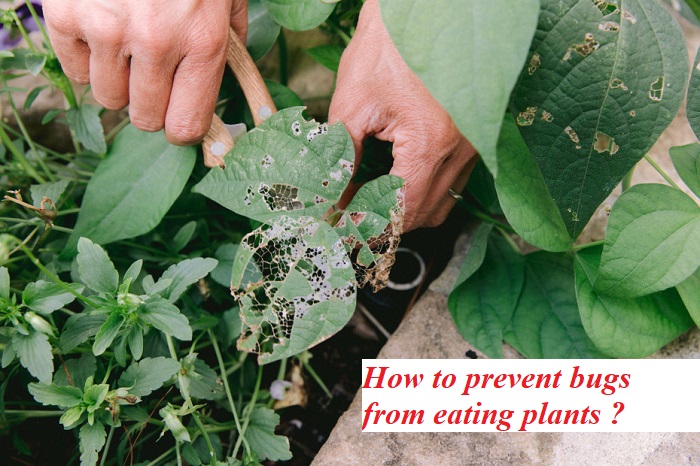Gardening is a rewarding hobby, but nothing is more frustrating than finding your plants riddled with holes or covered in pests. The good news is that there are plenty of natural and effective ways to prevent bugs from eating your plants. Whether you’re growing vegetables, flowers, or herbs, these strategies will help you protect your garden from harmful insects without resorting to harsh chemicals.

Common Garden Pests and Their Effects on Plants
Identifying Common Pests in Your Garden
To effectively combat pests, you first need to know your enemy. Some of the most common garden pests include:
- Aphids: Tiny, sap-sucking insects that cluster on new growth.
- Slugs and Snails: These pests leave large, irregular holes in leaves and are most active at night.
- Caterpillars: The larvae of moths and butterflies, caterpillars can quickly defoliate plants.
- Spider Mites: These tiny creatures are nearly invisible but leave a characteristic stippling on leaves.
- Whiteflies: Small, white insects that fly up in clouds when disturbed.
How Bugs Damage Plants
Bugs can cause a variety of damage to your plants, from chewing on leaves and stems to sucking out vital nutrients. This not only weakens the plants but also makes them more susceptible to diseases. Additionally, pests can spread viruses and bacteria, leading to further issues in your garden.
Natural Methods to Prevent Bugs from Eating Plants
Companion Planting Strategies
Companion planting is a powerful, natural method to keep pests at bay. By planting certain plants together, you can create an environment that deters pests while promoting healthy growth. For example:
- Marigolds: Repel nematodes, aphids, and other insects.
- Basil: Deters mosquitoes and flies, and enhances the flavor of tomatoes.
- Lavender: Keeps moths, fleas, and whiteflies away.
Using Essential Oils and Natural Sprays
Essential oils are another excellent way to prevent bugs from eating your plants. Oils like neem, peppermint, and eucalyptus have strong insect-repellent properties. Here’s how to make a simple spray:
DIY Neem Oil Spray:
- Mix 1 teaspoon of neem oil with 1 liter of water.
- Add a few drops of dish soap to help the oil mix with the water.
- Spray the solution on your plants, especially on the undersides of leaves where pests tend to hide.
Introducing Beneficial Insects
Not all insects are bad for your garden. In fact, some insects can be your greatest allies in the fight against pests. Consider introducing beneficial insects like:
- Ladybugs: They devour aphids and other soft-bodied insects.
- Lacewings: These insects are effective against aphids, caterpillars, and mites.
- Parasitic Wasps: They target caterpillars and other larvae.
Creating Physical Barriers
Sometimes, the simplest solution is the best. Physical barriers can prevent pests from reaching your plants in the first place. Consider using:
- Row Covers: Lightweight fabric that lets in sunlight and water but keeps bugs out.
- Insect Netting: Ideal for protecting fruit and vegetables from larger pests like birds and rabbits.
- Copper Tape: Effective against slugs and snails, as they receive a mild electric shock upon contact.
Organic Products for Pest Control
Neem Oil
Neem oil is a highly effective organic pesticide that disrupts the life cycle of insects, making it harder for them to feed, grow, and reproduce. It’s safe for use on most plants and can be applied regularly for ongoing protection.
Diatomaceous Earth
Diatomaceous earth is a natural powder made from fossilized algae. It works by dehydrating insects upon contact, making it an excellent choice for controlling pests like slugs, ants, and beetles. Sprinkle it around the base of plants or directly on the soil.
Insecticidal Soaps
Insecticidal soaps are made from natural ingredients and are safe to use on edible plants. They work by breaking down the protective outer layer of insects, leading to dehydration and death. Use insecticidal soap to target soft-bodied pests like aphids, whiteflies, and spider mites.
DIY Remedies to Protect Your Garden
Homemade Garlic Spray
Garlic is a natural insect repellent that can be easily made into a spray. Here’s a simple recipe:
Garlic Spray Recipe:
- Crush 2 bulbs of garlic and soak them in 1 liter of water for 24 hours.
- Strain the mixture and add a teaspoon of liquid soap.
- Spray the solution on your plants to repel pests like aphids and caterpillars.
Coffee Grounds and Eggshells
Both coffee grounds and crushed eggshells can help deter pests. Sprinkle coffee grounds around the base of plants to repel slugs and snails, or use crushed eggshells to create a sharp barrier that pests won’t want to cross.
Preventative Measures and Garden Maintenance
Regular Inspections and Early Intervention
The best defense is a good offense. Regularly inspect your plants for early signs of pest activity. Check the undersides of leaves, stems, and soil for any unusual activity. Early detection allows you to address the problem before it becomes a full-blown infestation.
Healthy Soil and Plant Care Practices
Healthy plants are better equipped to withstand pest attacks. Ensure your garden soil is rich in nutrients and well-drained. Regularly prune your plants to improve air circulation and remove any dead or diseased parts.
Conclusion
Protecting your garden from bugs doesn’t have to involve harmful chemicals. By using natural methods like companion planting, essential oils, and introducing beneficial insects, you can create a thriving, pest-free garden. Remember to regularly inspect your plants, use organic products, and employ physical barriers as needed. With these strategies, you’ll be able to enjoy a healthy, productive garden all season long.
FAQs
What are the best natural ways to prevent bugs from eating plants?
The best natural methods include using companion plants, essential oil sprays, introducing beneficial insects, and creating physical barriers.
How often should I apply neem oil to protect my plants?
Apply neem oil every 7-14 days, depending on the severity of the pest problem and the specific needs of your plants.
Can companion planting really help reduce garden pests?
Yes, companion planting is an effective way to deter pests by using plants that naturally repel insects or attract beneficial predators.
What are the safest organic products for pest control in a vegetable garden?
Neem oil, diatomaceous earth, and insecticidal soaps are some of the safest and most effective organic products for controlling pests in vegetable gardens.

Related Articles :